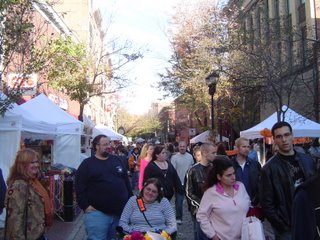Information on Home Buying & Selling, and state of the real estate market in Salem and the entire north shore of Massachusetts including Beverly, Peabody, Lynn, Danvers, Middleton, Ipswich, Hamilton, Wenham, Essex, Rowley, Manchester-by-the-Sea, Newburyport, Plum Island, Amesbury, Groveland, Georgetown, Haverhill, Merrimac, Andover, Etc.
Tuesday, October 31, 2006
Just yesterday I was reading the single family sales for the first 9 months of this year in Salem MA compared to last year. The number of homes sold were almost exactly the same - 162 for 2005 and 160 for 2006 - statistically the same. The big difference is the average sale price - $359,500 for 2005 compared to $319,750 for 2006. I know what you are thinking - OMG, that's a almost a 12% decrease! The bubble has burst and the real estate market is in shambles!
But let's take a closer look at the figures. For an accurate look at the market, you have to compare apples to apples - or in our case, similar style and age homes. You cannot just take the total sales and make generalizations about what is happening with the market. Lets take a look at the sales for a specific home style. I'm going to use capes, because they were for the most part built around the same time - late 1940's through 1950's. I'm going to further break them down and only look at 3 bedroom capes. Now I could narrow it down even more by looking at square footage of living space, # of baths, lot size and neighborhood, but for this purpose just style and bedrooms will do.
In 2005, the average 3 bedroom cape-style home sold for $351,857. In 2006, the average was $339,900. This is a difference of just over 3%. Quite a bit of difference between this and the 12% published in Bankers & Tradesman. But it is a more accurate picture of the real estate market. The reason Bankers & Tradesman shows such a difference is simple - less expensive homes have been selling faster than more expensive homes. It not because the bottom has fallen out of the market.
Real estate runs in cycles, and we are currently going through a normal cycle. In every case the prices comes back up again and usually surpass where they were before the downturn. So is today a good time to buy a home? Yes, it's a great time to buy. Mortgage interest rates are still great, and because there are so many homes on the market, the sellers are willing to negotiate. Your best tool in this (or any) market is your real estate agent. Your agent will help you find the home that meets your needs, and will help negotiate for the lowest price.
So if you want a home, get off your arse (sorry, it's the Scottish in me), and make some appointments to see a few homes. You may even find your "dream home" (more on that in a later blog).
Jim
Tuesday, October 24, 2006
But don't wait for an open house to see that home that you like. Many agents are not doing open houses because they have been getting very little response to them. Call your Buyer's Agent to make an appointment for you. This is even more important if there has been a recent price drop on the property, because that usually creates a plethora of activity, even in a slow market.
Here are some stats for the current real estate market on the north shore of Massachusetts.
Compared to this same day 1 year ago:
- There are 7364 properties on the market. Last year there were 6414.
- Time on market this year is 146 days, compared with 105 days last year.
- The median price is list $379,900 compared to $395,000 for 2005.
These stats are for a combined single, multi and condos.
Average sale price over the last 3 months was $408,537, compared with the same 3 month period last last of $403,369. Confusing, isn't it? First I tell you that the current on market prices are lower than last year, then I tell you that the last 3 months sale prices are higher that 2005! What' sgoing on?
Well , the key phase is that the sale prices were for the last 3 months, which included a pretty good sales period. It's only the last couple of months where we have seen wholesale dropping of prices, which is why the current list prices are lower than 2005's.
Of course, every town varies slightly. Salem for example is still doing very well, mainly because of the proximity to the commuter train and the vibrant downtown (where everyone wants to live!)
